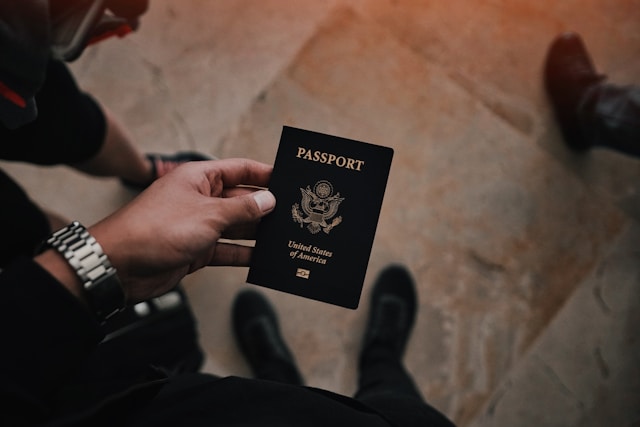What Felonies Disqualify You from Getting a Passport: A Comprehensive Guide

Individuals who have been convicted of a felony may face restrictions on their ability to obtain a passport. The United States Department of State has specific guidelines regarding passport eligibility, and certain felonies can disqualify an individual from obtaining a passport.
In general, the Department of State may deny an individual a passport if they are currently under arrest, on parole, or on probation for a felony offense. Additionally, if an individual is subject to a court order that prohibits them from leaving the country, they may be unable to obtain a passport. It is important to note that even if an individual has completed their sentence for a felony offense, they may still face restrictions on their ability to obtain a passport.
If you have been convicted of a felony and are unsure about your eligibility for a passport, it is recommended that you consult with a legal professional. They can provide you with guidance on the specific restrictions that may apply to your situation and help you navigate the process of obtaining a passport.

Understanding Passport Eligibility and Restrictions
General Eligibility Criteria for Obtaining a Passport
To obtain a U.S. passport, an individual must be a U.S. citizen. Proof of citizenship must be presented at the time of application, which can be done through documentation such as a birth certificate, naturalization certificate, or previous passport. The individual must also submit a completed DS-11 passport application form and a passport photo that meets the passport photo requirements.
Specific Restrictions Affecting Passport Issuance
There are several restrictions that can affect an individual’s eligibility for a U.S. passport. One of the most common restrictions is unpaid child support. According to federal law, an individual who owes more than $2,500 in unpaid child support may not be able to obtain a passport. Similarly, individuals with unpaid federal taxes or tax debt may also be restricted from obtaining a passport.
Another restriction that can affect passport issuance is a felony conviction. Individuals with a felony conviction, especially those with felony drug convictions or drug trafficking charges, may be disqualified from obtaining a passport. It is important to note that even if an individual has completed their sentence or probation, their criminal record may still affect their passport eligibility.
When applying for a passport, it is important to disclose any felony charges or convictions on the application. Failure to do so can result in the denial of a passport or even criminal charges. It is recommended that individuals consult with a passport acceptance facility or legal professional if they have any concerns about their passport eligibility.
Overall, obtaining a U.S. passport requires meeting specific eligibility criteria and complying with restrictions set forth by federal law. By understanding these requirements and restrictions, individuals can ensure a smooth and successful passport application process.

Impact of Felony Convictions on Passport Application
Individuals who have been convicted of certain felonies may be disqualified from obtaining a passport. This is due to concerns related to national security and international travel restrictions. The following sections outline the types of felonies that may lead to disqualification and the specific restrictions for drug trafficking and financial felonies.
Types of Felonies That May Lead to Disqualification
Felony convictions that involve drug offenses, federal warrants, and felony arrest warrants may lead to disqualification from obtaining a passport. Additionally, individuals with delinquent tax debt or child support arrears may also be disqualified.
Drug Trafficking Convictions and Passport Restrictions
Individuals who have been convicted of drug trafficking or other felony drug convictions may be subject to passport restrictions. These restrictions may include a denial of passport issuance or a revocation of an existing passport. The specific restrictions depend on the severity of the offense and the individual’s criminal history.
Financial Felonies and Passport Eligibility
Individuals with certain financial felonies, such as federal loans that are in default or convictions related to fraud or embezzlement, may also be disqualified from obtaining a passport. These restrictions are in place to prevent individuals from fleeing the country to avoid paying their debts or facing criminal charges.
It is important to note that the above restrictions apply to all individuals, including convicted felons. However, not all felons will be disqualified from obtaining a passport. The severity of the offense and the individual’s criminal history will be taken into account when determining eligibility.
Overall, individuals with felony convictions should be aware of the potential restrictions on their ability to obtain a passport. It is recommended that they consult with a legal professional for guidance on their specific situation.
Legal Considerations and Consequences of Applying with a Felony
Individuals with a felony conviction may face legal consequences when applying for a passport. It is important to understand the legal obligations and restrictions that come with having a felony conviction.
Legal Obligations and Child Support
Individuals who owe child support may encounter issues when applying for a passport. The U.S. Department of Health and Human Services can report individuals who owe more than $2,500 in child support to the Department of State. This can result in the denial, revocation, or limitation of a passport.

Probation, Parole, and International Travel
Individuals who are on probation or parole may face restrictions on international travel. Official court documents and probation orders may include travel restrictions that prohibit individuals from leaving the country without permission from their probation officer or the court.
Incarcerated individuals may also face restrictions on international travel. If an individual is released on probation or parole, they may need to obtain permission from their probation officer or the court before leaving the country.
It is important to understand the consequences of applying for a passport with a felony conviction. Individuals with a felony conviction should consult with their probation officer or attorney before attempting to leave the country.
Navigating the Passport Application Process with a Felony Record
Individuals with a felony record may face additional challenges when applying for a passport. However, it is still possible for felons to obtain a passport if they meet certain requirements and follow the proper procedures.
Completing Passport Application Forms with a Criminal History
When applying for a passport, individuals with a criminal history must disclose their convictions on the application form. The application form, known as DS-11, asks for information about any felony convictions, including the type of crime, the date of conviction, and the sentence imposed.
It is important to be honest and accurate when completing the application form, as providing false information can result in the denial of a passport or even criminal charges.
Additional Documentation and Proof Required for Felons
In addition to the standard passport application form, felons may be required to provide additional documentation and proof of their identity. This may include a copy of their criminal record, a letter from their probation or parole officer, or a court order restoring their civil rights.
Felons may also be required to provide additional photo identification, such as a driver’s license or state-issued ID card. It is important to check with the passport agency or embassy where the application will be submitted to determine what additional documentation is required.
Passport Fees for Felons
Felons are required to pay the same passport fees as any other applicant. The fees vary depending on the type of passport and the processing time requested. It is important to note that passport fees are non-refundable, even if the application is denied.

State Department Review of Felon Passport Applications
Passport applications from individuals with a criminal history are subject to additional review by the State Department. The review process may take longer than for standard passport applications, and may result in the denial of the application.
Overall, individuals with a felony record may face additional challenges when applying for a passport. However, by following the proper procedures and providing accurate information and documentation, it is still possible for felons to obtain a passport and travel internationally.
Travel Considerations and Limitations for Felons
Individuals with a felony conviction may face restrictions when it comes to international travel. The severity of the crime and the country being visited can play a significant role in determining whether a felon is allowed entry. Additionally, felons who wish to obtain or renew a passport may face certain limitations.
Countries with Entry Restrictions for Felons
Many countries have strict entry restrictions for individuals with a felony conviction. For example, Mexico may deny entry to individuals with a criminal record, including those with a felony conviction. Similarly, individuals with a felony conviction may be barred from entering Canada, the United Kingdom, and other countries.
It is important to note that each country has its own set of rules and regulations regarding entry restrictions for felons. It is recommended that individuals with a felony conviction research the entry requirements for the country they wish to visit before making travel plans.
Passport Validity and Renewal Concerns
Individuals with a felony conviction may face limitations when it comes to obtaining or renewing a passport. The U.S. Department of State may deny a passport application if the individual has been convicted of a felony drug offense or if they are currently under a court order to pay child support.
Additionally, individuals with a felony conviction may face restrictions when it comes to the validity of their passport. For example, some countries may require that a passport be valid for six months beyond the date of entry. If a felon’s passport is set to expire within that time frame, they may be denied entry.
It is important for felons to understand the limitations and restrictions they may face when it comes to international travel and passport applications. By researching entry requirements and understanding the rules and regulations, felons can make informed decisions about their travel plans.

Conclusion
Obtaining a passport is an important process for many individuals, allowing them the freedom to travel abroad for various reasons. However, certain circumstances can disqualify a person from obtaining a passport, including felony convictions.
The United States government takes felonies seriously and has implemented laws to restrict individuals with certain convictions from obtaining a passport. These disqualifying offenses include drug trafficking, international parental kidnapping, and certain sex offenses.
It is important to note that not all felony convictions will disqualify an individual from obtaining a passport. The circumstances surrounding the conviction, such as the severity of the offense and the length of the sentence, are taken into consideration.
Individuals who have been convicted of a felony and are unsure if they are eligible for a passport should consult with a legal professional or the U.S. Department of State for further guidance.
Overall, it is important to understand the laws and regulations surrounding felony convictions and obtaining a passport to avoid any potential legal issues.


